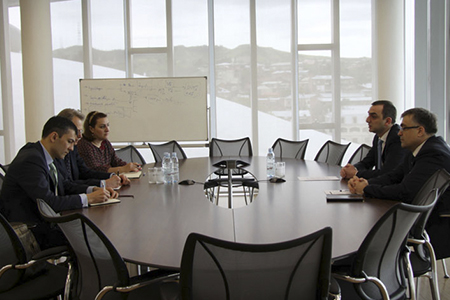Georgian Lari exchange rate in focus at IMF and NBG meeting

International Monetary Fund (IMF) official and Georgia’s National Bank President met in Georgia’s capital Tbilisi today to discuss the current situation in the region and the major factors that have influenced the country’s national currency exchange rate.
IMF deputy director of Middle East and Central Asia Department Juha Kahkonen said national currency Lari devaluation was somehow good for the country as its export maintained the competitiveness.
"The general situation in the region is quiet precarious. The risks in the region might continue for a long time. The economy policy should adjust to the current challenge which is Lari devaluation for Georgia. However, Lari depreciation was somehow good for Georgia as the country’s export competitiveness maintained. This should be reflected to farther growth of the export,” Kahkonen said.
Kahkonen believed the flexible exchange rate was favourable for Georgia to face the current challenges as well as to overcome the future challenges. He said the NBG should keep the low inflation rate not to increase the prices.
Meanwhile, NBG President Giorgi Kadagidze said the factors affecting the exchange rate were settled.
"Based on the information that we have today all the factors affecting the exchange rate are settled. Accordingly we do not expect Lari devaluation in the medium term,” Kadagidze said.
"We understand how painful it is for the citizens who have loans in US dollar and income in Lari. We feel huge responsibility and we are monitoring the processes. But when there is less inflow of foreign currency in the country, it is an illusion to search for the key in National Bank and monetary instruments to solve the problem,” he added.
As NBG President said the country’s National Bank implemented the policy according to the best international practices which were recognized by the all international organizations, including the IMF.
"We are carrying out the only correct policy available to us in the current situation against a background of the external shocks. The solution lies in the so-called second-generation reforms and unpopular, difficult decisions. These decisions must be necessarily made and I will specifically talk about it next week, during my speech in the Parliament,” Kadagidze said.
However, Kadagidze did not elaborate on what he meant by "second-generation reforms”.
He also expressed hope that the upcoming discussions in Parliament will be mainly focused on problem solving and reforms.
 Tweet
Tweet  Share
Share